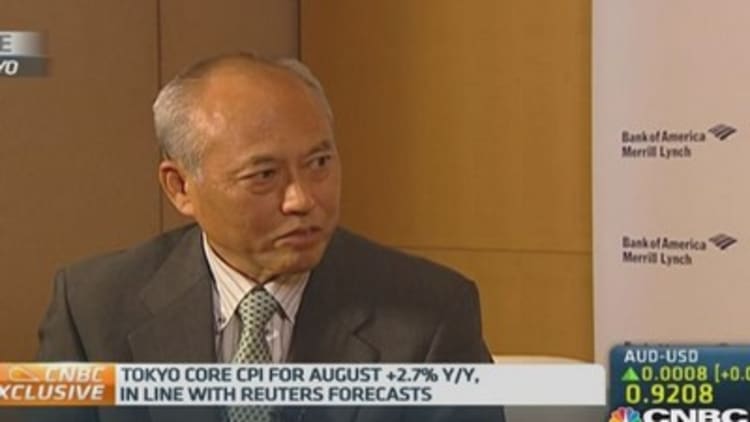
Japanese Prime Minister Shinzo Abe faces a tough decision on whether to hike the consumption tax to 10 percent next year given the nation's nascent economic recovery, the governor of Tokyo told CNBC on Wednesday.
"The GDP (gross domestic product) figures are going down, [so] it's a very, very difficult question," Governor of Tokyo Yoichi Masuzoe said in an interview with CNBC's Kaori Enjoji.
Japan raised its sales tax to 8 percent from 5 percent in April, a move that's dragged on the world's third-largest economy. The economy shrank an annualized 7.1 percent in the second quarter, revised GDP figures showed on Monday.
Read MoreHow low will yen go? Depends on the dollar
Markets are questioning if Abe should forge ahead with a further hike to 10 percent scheduled for October 2015, and risk unraveling the traction in 'Abenomics' – his radical policies to kickstart the economy.
"I think Mr. Abe should decide to raise this [consumption tax] up to 10 percent. But, he has some risks," Masuzoe said, adding that he expects the economy to withstand the effects of the hike.
"As far as Tokyo is concerned, the economy is going up. Given the Olympics games which will be held in six years, Tokyo is working so hard. So we can help pull up the economy," he added.
Read MoreJapan revised Q2 GDP worse than initial estimates
Beyond reining in Japan's snowballing public debt, which is more than twice the size of the $5 trillion economy, the consumption tax hike can provide Abe with leeway for his pledge to cut corporate taxes to 30 percent from 40 percent to spur growth.
"It's a problem – a big problem. We do agree to get the corporate tax rate to 30 percent. But Mr. Abe is trying to do it, possibly in one year," Masuzoe said.
Masuzoe, who is also Japan's labor minister, also weighed in on the contentious issue of introducing foreign workers to plug gaps in its rapidly shrinking workforce.
Read MoreJapan has fallen victim to the Keynesian scam
"Especially on the construction side – we need the workers. But there are a couple of questions. One is how to introduce the immigrant workers, foreign workers. And it's coming," Masuzoe said.
The world's fastest-aging economy is desperate for more workers, especially to support an expected building boom ahead of the 2020 Tokyo Olympics. Foreign-born workers make up less than 1.3 percent of Japan's workforce, according to the 2010 census.

